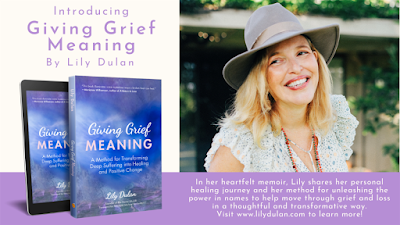I had a chance to interview leading grief expert Lily Dulan. A marriage and family therapist, psychotherapist and certified yoga teacher, Lily has developed a new and unique therapy for healing and self-discovery which can be harnessed in every facet of our lives. Lily is determined to change the conversation about grief. The pandemic equalized us all and after a year of lock down and isolation, the entire world is ready to heal from the collective grief we’ve all felt - stress, sorrow, loss and mourning - in unprecedented ways.
Why are we all experiencing a sort of collective grief?
--We are all experiencing a collective grief because the world has been upended as we know it. The violence and death that we have witnessed this year is enough to arouse fear and sadness in most everyone. Plus, our normal social, recreational, educational and work activities have completely come to a halt.
Why is it important to recognize that grief - whether collective or personal - impacts everyone differently?
—I write in my book Giving Grief Meaning that there is no right or wrong way to grieve. We are all unique like snowflakes, and have our own thumbprints. In light of this, it should come as no surprise that everyone grieves differently. This become important to recognize, because there is no time line on grief and no one correct expression of grief. For some, grief increases their faith in God, and for others their idea of God is crushed. Some grow from life’s sorrows and other become brittle and terse. For some, grief is filled with regret and for others it presents as an intense longing. Some can’t stop counting the days, or smelling a loved ones clothes. Still others slip into a heavy fog. There are as many expressions of grief as there are stars in the sky. The best way forward is to remember the popular saying “Treat people as if they are fighting a battle you know nothing about and be kind always.”
What are some healthy ways to express and process grief?
--Becoming aware of our heartbeat and breath and practicing mindfulness techniques can help us become aware of where we are holding our grief in our bodies. The late Author Stephen Levine writes about softening to the pain. It may seem like an oxymoron, but if we move towards our pain and watch it come and go— we can watch it shift and change. These practices can help our own internal states become less oppressive. It also helps to join a grief support group and see a qualified Therapist. I have created the Giving Grief Meaning Collective on Facebook-- and while it shouldn’t replace therapy, it is a great way to find community on the path.
How can people reach out to those around them who may be grieving?
—Often people are afraid to reach out to those who are grieving for fear of saying the wrong thing. It’s important to move through this fear and just say something even if it is just, “Im sorry for your loss.” It is helpful to remember never to say "don’t cry" or "everything happens for a reason.” People in grief need to be heard, not fixed.
Why is it important to recognize that grief - whether collective or personal - impacts everyone differently?
—I write in my book Giving Grief Meaning that there is no right or wrong way to grieve. We are all unique like snowflakes, and have our own thumbprints. In light of this, it should come as no surprise that everyone grieves differently. This become important to recognize, because there is no time line on grief and no one correct expression of grief. For some, grief increases their faith in God, and for others their idea of God is crushed. Some grow from life’s sorrows and other become brittle and terse. For some, grief is filled with regret and for others it presents as an intense longing. Some can’t stop counting the days, or smelling a loved ones clothes. Still others slip into a heavy fog. There are as many expressions of grief as there are stars in the sky. The best way forward is to remember the popular saying “Treat people as if they are fighting a battle you know nothing about and be kind always.”
What are some healthy ways to express and process grief?
--Becoming aware of our heartbeat and breath and practicing mindfulness techniques can help us become aware of where we are holding our grief in our bodies. The late Author Stephen Levine writes about softening to the pain. It may seem like an oxymoron, but if we move towards our pain and watch it come and go— we can watch it shift and change. These practices can help our own internal states become less oppressive. It also helps to join a grief support group and see a qualified Therapist. I have created the Giving Grief Meaning Collective on Facebook-- and while it shouldn’t replace therapy, it is a great way to find community on the path.
How can people reach out to those around them who may be grieving?
—Often people are afraid to reach out to those who are grieving for fear of saying the wrong thing. It’s important to move through this fear and just say something even if it is just, “Im sorry for your loss.” It is helpful to remember never to say "don’t cry" or "everything happens for a reason.” People in grief need to be heard, not fixed.


No comments:
Post a Comment